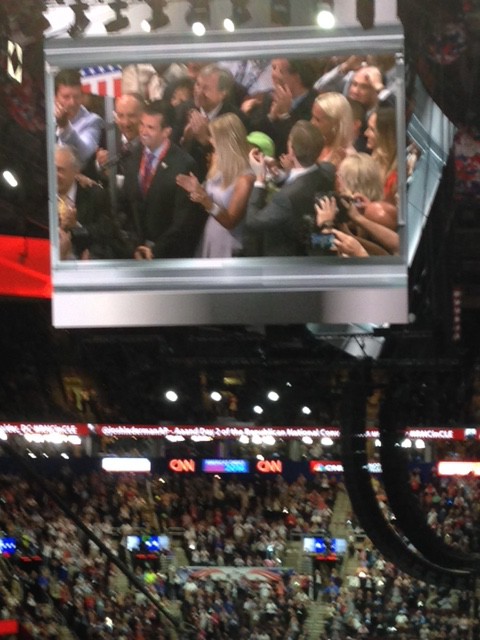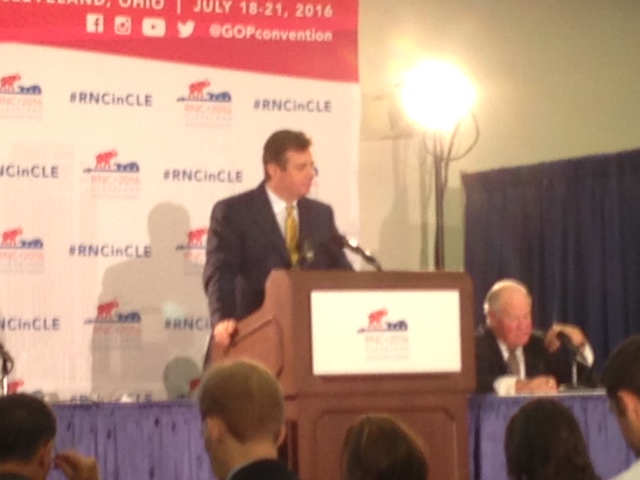So it was, at 5:58 p.m., July 19, 2016, that Jeff Sessions, U.S. Senator from Alabama, officially nominated Donald J. Trump as the Republican Party’s candidate for President of the United States. While a heavy majority of GOP delegates rose to their feet with a lusty cheer, an obvious rump stayed on their rumps, arms crossed, some shaking heads, others blank in disbelief. Chris Collins, U.S. Rep. from N.Y., seconded both the nomination and the rhetoric. Other countries, most notably Mexico and China, have “stolen our jobs.” We will “take back our country” because Donald Trump is not a candidate, “but a movement.”
The roll call of states commenced and in spite of the obvious disagreements that persisted, there were elements of charm. The speakers relish their moment in the sun, mostly, and they glow with the pride of their state or territory as they step, ever so shimmeringly, into the limelight. Some probably find it corny, but the tradition represents the best of political conventions. For these few seconds, even if only symbolically, these relatively regular people share the stage with relatively irregular political heavyweights. The territories, so often afterthoughts in American politics, especially stand out. The American Samoan delegation reminded us of their prowess at producing NFL players, for example.
Eventually, the New York delegation deferred, waiting to be the state to put their favorite son over the top. The moment came when the candidate’s own son spoke on behalf of his fellow Empire Staters. The nomination was clinched. The scoreboard showed animated fireworks, and the music began to blare. It was finished.
As a political scientist, a supposed academic, I am trained to be detached, distanced enough to evaluate an argument, objective enough to see things apart from my own thoughts and emotions. This moment gnawed and forced me to question whether I was removed or an interested participant. Was I seeing this clearly or personally?
I grew up in a Republican household, where to be a Democrat was assumed to be irrational, bordering on unpatriotic. Conservatism wasn’t just right, it was common sense. The GOP I encountered was built on free trade, limited government, and lower taxes. It sought to protect private property and it believed that economic freedom was the necessary ingredient for economic flourishing. Socially, it was traditional and more than friendly to religion. It stood against abortion and in favor of prayer in schools. The GOP recognized that government has a moral responsibility to encourage virtue while also protecting the weak and vulnerable from cultural destruction. On foreign policy, the GOP was robust and muscular, drawing sharp contrasts with the Soviet Union. Reagan called it an “evil empire” and implored Gorbachev to “tear down” the Berlin Wall. It was an exporter of democratic ideals. Essentially, I grew up in Reagan’s shadow and as a believer in his particular brand of conservatism.
We can argue about whether these things are right or wrong, good or bad. I am not here advocating those ideals. We can argue about the sincerity and uniformity with which the GOP has held those positions. What we cannot argue is whether or not the Trump Campaign embraces these kinds of principles. All indications until Cleveland are that it does not. When the collected delegates chose Donald Trump as their nominee, whether you agree with Trump or not, the Republican Party became something different from the party that weaned me. Let us be clear:
- Trump is against free trade and in favor of “America first” trade.
- The party of family values just nominated a man on his third wife and has sat with a straight face as he has been described as a family man who is extremely loyal.
- Trump is a nationalist with warm regards for Putin.
- Instead of tearing down walls that tyrants build, Trump wishes to erect them.
- To my knowledge (I have not witnessed every speech–far from it, in fact), there has been either zero or limited discussion of traditionally Republican moral positions. The party, in the Age of Trump, seems neither pro-life nor pro-choice, at least rhetorically.
- Instead of dismantling, or at least reforming, the New Deal state, Trump wishes to perpetuate it.
- He believes we were lied into war with Iraq after 9/11 and he at least implies we don’t know who knocked down the World Trade Center.
There is more head-scratching, I think, that I must address–not because it concerns me, but I just don’t understand it. One of the GOP’s great vulnerabilities since the 1930s has been its persistent portrayal as the party of the rich. Progressives have derided Republicans as top hat wearing industrialists willing to push granny in front of a train if it makes them an extra buck. Mitt Romney was mercilessly tormented for being a multi-millionaire. To show you the long roots of this, in 1952, as Eisenhower’s V.P. candidate, Richard Nixon was criticized for using a campaign donation for personal expenses. He denied the claim in the famous “Checkers Speech,” laying out his financial situation to the world. To demonstrate his modest means, he said his wife Patricia “doesn’t have a mink coat. But she does have a respectable Republican cloth coat, and I always tell her she would look good in anything.”
The GOP has often courted candidates of great wealth. Besides Romney, the Bushes are a family of means, for example. Republican wealth, though, has frequently been worn as humbly as possible, not only because it is good manners, but to counteract this impression that policies are pursued to enrich the upper class. Donald Trump, to be generous, makes no secret of his wealth. In fact, he used his bank account to shame his opponents and critics and to label them as financial “losers.” The Trump brand is gold and gaudy by design. Does the shine of celebrity obscure everything else? Does the desire to defeat Hillary blind people to Trump’s flaws?
As I have said frequently, at least for the near future, the Republican Party is no longer the party of Reagan, the Bushes, or Mitt Romney. It is Donald Trump’s party.
One final line of commentary and I am off.
One of the Trump Campaign’s goals this week is to urge people to reconsider Donald Trump, to reintroduce him not only to the world, but to the convention itself. The Trump family (Melania, Tiffany, and Donald, Jr.) has been Trump’s greatest asset here in Cleveland. In a press conference this morning, Paul Manafort addressed this, saying the point is to show the Trump “we don’t see on the campaign trail.” His wife and children have spoken of his love, care, and kindness, his respect for everyone, and his willingness to listen to all who work for him, in spite of their pedigree or salary.
All of this has been effective and it makes you question what you know of Donald J. Trump. I cannot speak for anyone here, but this portrait nags at me. Let’s assume that everything we have heard about Trump this week is true and accurate. How does that fit with Donald J. Trump the campaigner? The Tweeter? How does it fit with his humiliation of those with less wealth, or making fun of the handicapped, or his constant criticism of women and their looks? How does it fit with his broad denigration of Mexicans or Muslims?
These pro-Trump profiles have not really illuminated part of Trump that is hidden. Instead, they have contradicted the Trump we have already seen.
Again, let’s assume everything we have heard is true. If so, his campaign has been built on a public image that is at minimum at extreme odds with the person. This suggests Trump is at least quite manipulative or at worst a fraud. I can tell you from rubbing shoulders with his supporters, they are voting for the candidate they have seen. They are voting for what they perceive as the authentic man who will say anything and do anything, one who is unbound by common and suffocating sensibilities.
His supporters, clearly, would justify this as necessary for the political moment. It is worth it because of the importance of now or to defeat Hillary Clinton. It is evidence of his willingness to “hit back” and to “fight” for us as Americans. This line of argument vexes me, I am afraid, because it is essentially a justification of the means of the Trump Campaign in light of the nobility or necessity of its ends. Shouldn’t means and ends both be important? Doesn’t virtue demand some consistency between them?
I suppose I could ramble on for another thousand words, but this will have to do for now.

You have to love convention headwear.

The day the music started for some and died for others.

Paul Manafort Press Conference This Morning

Cameras in the back during the press conference. There were also probably 80 reporters sitting in front of this area.
 Bert Wheeler
Bert Wheeler
 Jeff Haymond
Jeff Haymond
 Marc Clauson
Marc Clauson
 Mark Caleb Smith
Mark Caleb Smith
 Tom Mach
Tom Mach